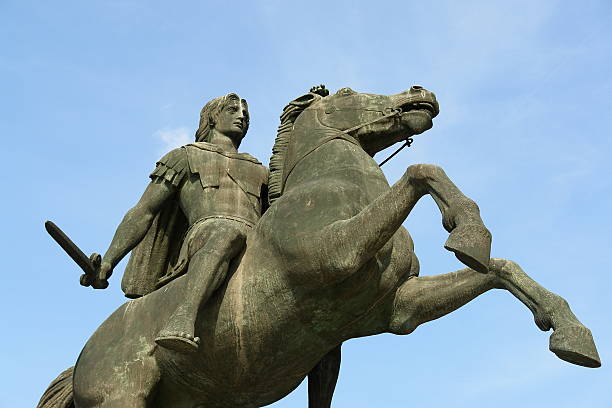Alexander of Macedon: Conquering the World with Ambition and Strategy
Introduction
Few names in the annals of history ring as deeply as Alexander of Macedon. Alexander is renowned for his unmatched military skill, astute strategic thinking, and unwavering desire. His conquests altered the course of history and left a lasting legacy that still fascinates and motivates people today.
Born in Macedonia in 356 BCE, Alexander of Macedon, sometimes referred to as Alexander the Great, was born. Though he came from a country destined for grandeur, his drive, cunning, and willpower were what made him a famous figure. Alexander gained knowledge from Aristotle that equipped him for conquering and ruling.
After taking the throne at the age of 20, Alexander launched a string of military expeditions that saw him annex large areas of land ranging from Greece to India. His creation of towns and promotion of a fusion of Greek, Persian, Egyptian, and Indian civilizations meant that his conquests were not just about extending boundaries but also about fostering cultural interchange.
The Early Years: From Macedonia to the World Stage
Alexander was born at Pella, the ancient Macedonian kingdom’s capital, in 356 BCE, setting off a voyage that would alter the path of history. He inherited a lineage of ambition and power as the son of King Philip II and Queen Olympias.
Alexander showed remarkable leadership abilities and a voracious appetite for information at an early age. He was given a thorough education under the guidance of the well-known philosopher Aristotle, which prepared him for his subsequent victories.
Childhood and Education
Alexander had a privileged and strict childhood. He immediately made a name for himself as a brilliant strategist and captivating leader after receiving training in both the arts of combat and diplomacy. His unquenchable curiosity drove him to study a wide range of topics, including physics, math, literature, philosophy, and more.
Ascension to the Royal Chair
At the age of 20, King Philip II was tragically assassinated. Alexander took advantage of the chance to become king and quickly established his dominance over the rival Macedonian aristocracy.
Conquest of the Persian Empire: A Triumph of Strategy and Determination
Determined to achieve his destiny as a conqueror and visionary leader, Alexander set his sights on the wide stretches of the Persian Empire with unyielding purpose.
The Issus Battle
At the Battle of Issus in 333 BCE, Alexander engaged the Persian army under the command of King Darius III. His superior strategy and well-trained army achieved a resounding victory in spite of being outnumbered, solidifying his supremacy in the area.
Tyre’s Siege
Despite Tyre’s strong fortifications, Alexander launched a daring siege that ultimately resulted in its collapse after seven months of nonstop fighting. This tactical victory enhanced his standing as a military genius.
Read More: Biography: Unraveling the Life Journey of Remarkable Individuals
Legacy and Impact: Alexander’s Enduring Influence on History
Alexander’s victories went much beyond the battlefield and had a lasting impact on the ancient world’s politics, cultures, and civilizations.
The diffusion of Hellenistic culture
Alexander’s goal in traveling eastward was to expand his kingdom by assimilating and integrating many civilizations, in addition to conquering them. His integration and cultural exchange programs created the conditions for Hellenistic culture to proliferate over the large areas he ruled.
Creator of Empires
Alexander established the foundation for his empire’s long legacy with a number of calculated partnerships, innovative infrastructural initiatives, and administrative reforms. For decades to follow, his cities—including the well-known Alexandria in Egypt—acted as bulwarks of knowledge, trade, and culture.
Frequently Asked Question
Alexander of Macedon was who?
Known by most as Alexander the Great, Alexander of Macedon was a well-known Greek ruler and military leader who ascended to prominence in the fourth century BCE.
Which were Alexander’s key victories?
Alexander expanded his kingdom from Greece to India by conquering the Persian kingdom, Egypt, and portions of Central Asia.
How did Alexander pass away?
Historians disagree on the precise reason of Alexander’s demise. While some ideas link it to disease or poisoning, others link it to combat traumas.
What effect did Alexander have on history?
Greek culture was widely dispersed throughout the ancient world as a result of Alexander’s conquests, which also helped to pave the way for the development of Hellenistic civilization.
Were Alexander’s heirs identified?
After Alexander’s death, his generals broke up his empire, which resulted in the creation of the Diadochi, a group of successor kingdoms.
What did Alexander leave behind?
People all throughout the world are still enthralled and motivated by Alexander’s legacy as a military strategist, inspirational leader, and cultural figure.
Summary
In summary, Alexander of Macedon’s life is marked by unmatched ambition, astute strategic judgment, and an enduring legacy. From his modest upbringing in Macedonia to his transcontinental conquests, Alexander’s voyage altered the course of history and still piques people’s interest today. His foresight, courage, and tenacity made a lasting impression on history, introducing Greek culture and establishing the framework for the Hellenistic period. We are inspired to pursue greatness and are reminded of the lasting force of bravery and tenacity when we consider his extraordinary life and accomplishments. One of the most recognizable people in history, Alexander of Macedon is a living example of the persistence of human desire and success.
